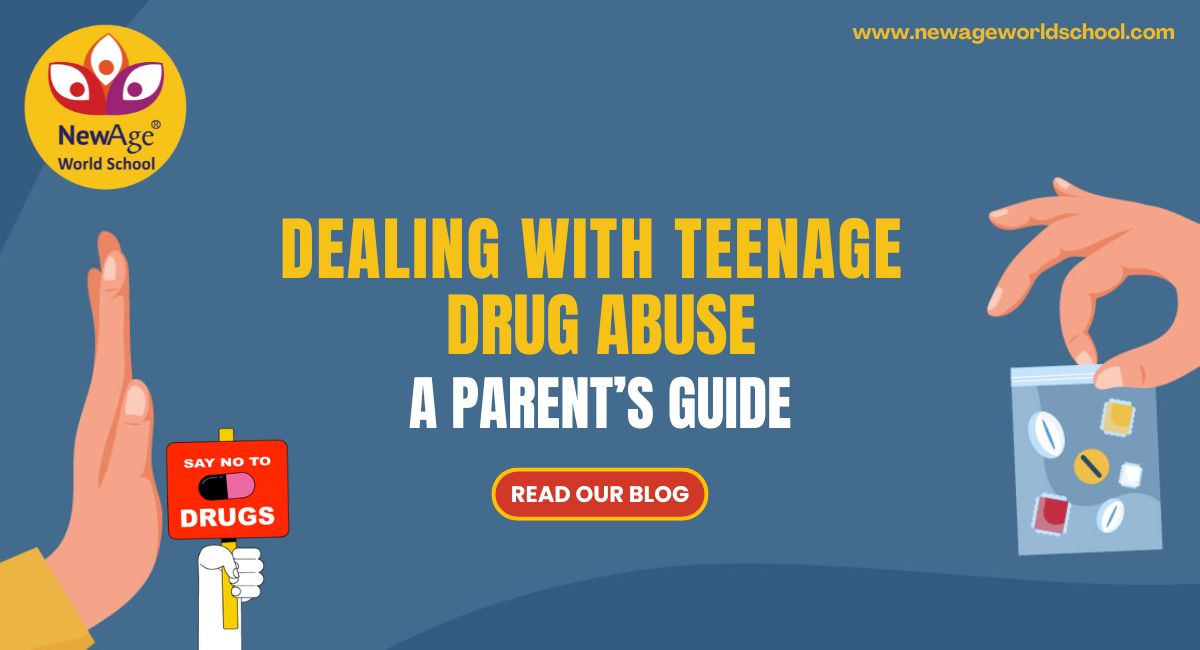Dealing with Teenage Drug Abuse: A Parent’s Guide

Table of content
Introduction
Why Teenagers Turn to Drugs
Recognizing the Signs: Drug Addiction Symptoms
Common Drug Addiction Symptoms in Teens
The Parental Role in Drug Addiction
Steps for Parental Support for Substance Abuse
Why Some Teens Turn to Drugs
Recognizing When to Get Teenage Addiction Help
Conclusion
FAQs
Introduction
Teenage years can be some of the most challenging years in life. As kids grow up and experience the world, they encounter pressure, stress, and sometimes confusion. Unfortunately, teenage drug addiction has become a growing issue, with teens often turning to substances not just due to peer pressure but also as a way to cope with personal struggles. Parents can often feel overwhelmed when faced with the reality of substance abuse in teenagers, but with the right guidance and support, they can make a significant difference.
Why Teenagers Turn to Drugs
Many parents assume their children are safe from substance abuse, believing "it could never happen to my child." However, sometimes, teens can start using substances for complex reasons, and often, the triggers are more than just peer pressure. Some teens turn to drugs due to feelings of loneliness, mental health challenges, or even curiosity. Understanding the causes of teenage drug addiction can help parents empathize with their teen's experience and offer effective support.
Common Reasons Teens Experiment with Drugs
1. Social Pressure: Many teens feel pressure to fit in, and some may try drugs simply because others around them are using them.
2. Mental Health Struggles: Depression, anxiety, and stress can make teens turn to substances as a coping mechanism.
3. Curiosity and Boredom: Adolescence is a time of exploration, and sometimes teens experiment out of sheer curiosity or boredom.
4. Media Influence: TV, movies, and music sometimes glamorize drug use, making it seem less risky.
By understanding these influences, parents can become better equipped to offer the right support and guidance.
Recognizing the Signs: Drug Addiction Symptoms
Early recognition of drug addiction symptoms can be key to helping a teenager before the problem escalates. Parents who are aware of the signs of drug addiction in teens may notice subtle behavioral and physical changes. Some teens may become more secretive or even display sudden mood swings, while others may lose interest in hobbies they once loved.
Common Drug Addiction Symptoms in Youth
Here are some drug abuse symptoms in youth that parents should look out for:
Physical Symptoms: Bloodshot eyes, frequent tiredness, unusual weight loss or gain.
Behavioral Changes: Aggression, irritability, withdrawal from family activities.
Social Patterns: New friend groups, increased secrecy about whereabouts, frequent absences from home.
By recognizing these signs early, parents can take action and provide the help for drug addiction in teens that may be necessary.
The Parental Role in Drug Addiction
Facing teenage drug addiction can be an emotionally intense experience for parents. It is common to feel overwhelmed or even question where things went wrong. However, the parental role in drug addiction is crucial in helping the teen get back on track. Rather than assigning blame, parents can focus on providing a steady, supportive environment for their child to open up and feel understood.
Steps for Parental Support for Substance Abuse
Parental involvement can be a powerful force in a teen's recovery journey. Here are some ways to provide parental support for substance abuse:
1. Open Communication
Creating an open line of communication can encourage teens to express their struggles without fear of judgment. Parents should aim to listen actively, showing understanding and empathy. It is essential to create a safe space for honest discussions, helping the teen feel less alone.
2. Set Boundaries and Consequences
While open communication is essential, setting boundaries is equally important. Teens need to understand that there are consequences to their actions, and clear rules can discourage further substance abuse. However, be sure the rules are fair and consistent.
3. Seek Professional Help for Drug Addiction in Teens
Sometimes, help for drug addiction in teens requires more than parental support. Therapy or counseling can give teens a structured space to explore the reasons behind their behavior. Working with professionals also provides teens with coping tools to manage stress, mental health challenges, and peer pressure in healthier ways.
Why Some Teens Turn to Drugs
Teens turn to drugs for various reasons, some of which may be surprising to parents. Some teenagers seek social acceptance, others want to escape from emotional pain, and some are simply curious. Let us take a closer look at the causes of teenage drug addiction:
1. Peer Pressure and Social Acceptance: The desire to fit in can make teens vulnerable to experimentation.
2. Mental Health Struggles: Conditions like depression or anxiety can lead some teens to seek temporary relief through substance use.
3. Influence of Media and Pop Culture: Movies, music, and online platforms often portray drug use as "cool," which can distort a teen's perception of the risks.
By understanding these influences, parents can gain insight into the complex factors behind teenage drug use and better address their child's specific needs.
Recognizing When to Get Teenage Addiction Help
If you notice any of these symptoms, do not hesitate to seek teenage addiction help. Early intervention can prevent more severe addiction issues and help teens regain control of their lives. Often, a combination of family support, professional counseling, and, if needed, medical treatment can make a substantial difference.
Indicators That Your Teen Needs Professional Help
Persistent changes in mood or behavior that do not improve over time.
Refusal to talk about what is troubling them or showing aggression when approached.
Increased involvement in risky behaviors or showing signs of depression.
Being proactive in seeking help can make a significant difference in your teen's recovery journey.
Conclusion
Teenage drug addiction is a complex issue, but parents can play a significant role in their teen's recovery journey. By maintaining awareness, fostering open communication, and seeking timely intervention, families can help their teens overcome the challenges of substance abuse in teenagers. If you observe any signs of drug addiction in teens or drug abuse symptoms in youth, it is crucial to act promptly. Your support, patience, and understanding are the most powerful tools you can offer, helping your teen find their way back to a healthier, happier life.
Frequently Asked Questions
When should parents seek professional help for their teen's drug use?
If a teen’s behavior shows persistent changes, aggression, or risky actions, it may be time to seek professional help. Therapy or counseling provides a structured approach to address underlying issues and develop healthier coping strategies.
Why do some teenagers start using drugs?
Teenagers may turn to drugs for various reasons, including peer pressure, mental health challenges, curiosity, and media influence. Understanding these causes can help parents address the root issues.
How can parents effectively support a teen struggling with substance abuse?
Parents can support their teen by maintaining open communication, setting clear boundaries, and seeking professional help if necessary. Creating a non-judgmental environment encourages the teen to share their struggles.
What are some early signs of drug addiction in teenagers?
Early signs may include sudden changes in mood or behavior, withdrawal from family activities, secrecy about whereabouts, and physical signs like bloodshot eyes or fatigue.

















Leave a Reply
Your email address will not be published. Required fields are marked *
Comments
No comments available